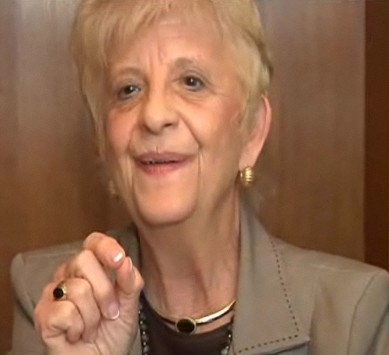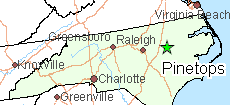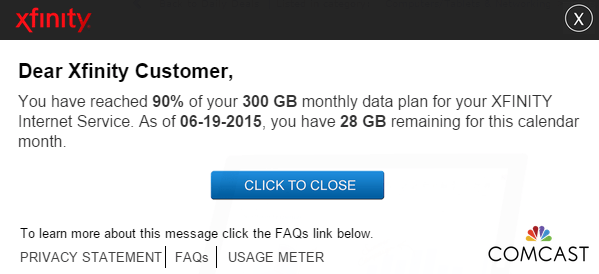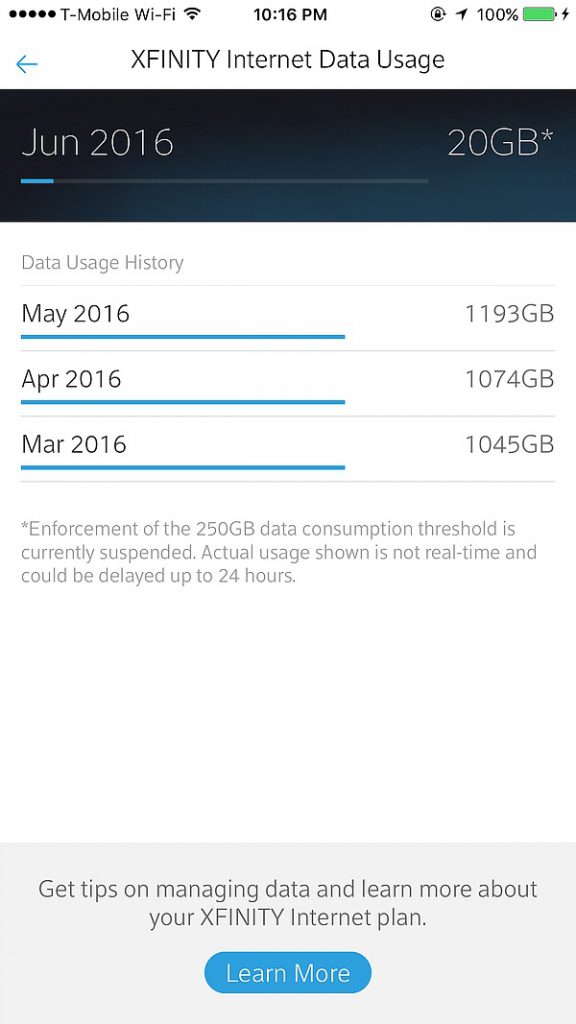Expired Data Usage Plans
Important Note: These data usage plans, which Comcast previously had in place, expired on June 1, 2016, and have been replaced with the new plans described above
In the markets of Huntsville, Mobile and Tuscaloosa, Alabama; Little Rock, Arkansas; Fort Lauderdale,the Keys, and Miami, Florida; Atlanta, Augusta and Savannah, Georgia; Houma, LaPlace, andShreveport, Louisiana; Jackson and Tupelo, Mississippi; Chattanooga, Greeneville, Johnson City/Gray,Knoxville, Memphis and Nashville, Tennessee; Charleston, South Carolina; and Galax, Virginia, we have increased our monthly data usage plan for all XFINITY Internet tiers to 300 GB per month and will offer additional gigabytes in increments/blocks ($10 per 50 GB). In this trial, you can also choose to enroll in an Unlimited Data Option for an additional recurring flat fee (e.g., $30-$35 per month). Under this option, the 300 GB data usage plan will not be enforced on your account. If you subscribe to Economy Plus or Performance Starter XFINITY Internet, you can instead choose to enroll in the Flexible Data Option to receive a $5 credit on your monthly bill if you reduce your data usage plan to 5 GB. If you choose this option and use 6 GB of data or more in any given month, you will not receive the $5 credit and will be charged an additional $1 for each gigabyte of data used over the 5 GB included in the Flexible Data Option.
In the markets of Central Kentucky and Maine, we have increased our data usage plan for XFINITY Internet tiers to 300 GB per month, offering additional gigabytes in increments/blocks ($10 per 50 GB). In this trial, XFINITY Internet Economy Plus customers can instead choose to enroll in the Flexible Data Option to receive a $5 credit on their monthly bill if they reduce their data usage plan to 5 GB. If you choose this option and use 6 GB of data or more in any given month, you will not receive the $5 credit and will be charged an additional $1 for each gigabyte of data used over the 5 GB included in the Flexible Data Option. Currently, the Unlimited Data Option is not available in these markets.
In the Tucson, Arizona, market, we have increased our monthly data usage plan for Economy Plus through Performance XFINITY Internet tiers to 300 GB. Those customers subscribed to the Performance Pro and Blast! Internet tiers receive 350 GB in their data usage plan; Blast! Pro customers receive 450 GB in their data usage plan; and Extreme customers receive 600 GB in their data usage plan. As in our other trial market areas, we offer additional gigabytes in increments/blocks of 50 GB for $10 each in the event the customer exceeds their included data amount. Currently, the Unlimited Data Option and the Flexible Data Option are not available in this market.
In Fresno, California, Economy Plus customers have the option of enrolling in the Flexible Data Option.


 Subscribe
Subscribe Stall, stall, stall. While Charter Communications and AT&T are working towards improving their broadband service offerings for Kentucky’s largest city, both companies are doing everything possible to slow down the arrival of their nemesis: Google Fiber, which is preparing to wire Louisville for gigabit fiber to the home service.
Stall, stall, stall. While Charter Communications and AT&T are working towards improving their broadband service offerings for Kentucky’s largest city, both companies are doing everything possible to slow down the arrival of their nemesis: Google Fiber, which is preparing to wire Louisville for gigabit fiber to the home service.
 Gillespie also claimed customers could endure poorer service and outages as a result of unauthorized contractors relocating Time Warner Cable’s equipment, often without the cable company’s knowledge.
Gillespie also claimed customers could endure poorer service and outages as a result of unauthorized contractors relocating Time Warner Cable’s equipment, often without the cable company’s knowledge. Altice’s bean counters have completed the first wave of cost cuts as part of the company’s notorious practice of “cutting to the bone,” laying off about 100 Cablevision employees managing IT, human resources, accounting and other back office operations at the cable company’s Bethpage, N.Y. headquarters.
Altice’s bean counters have completed the first wave of cost cuts as part of the company’s notorious practice of “cutting to the bone,” laying off about 100 Cablevision employees managing IT, human resources, accounting and other back office operations at the cable company’s Bethpage, N.Y. headquarters. Broadband life in Alaska is usually a choice (if you live in Fairbanks, Anchorage, Juneau, or another significantly sized city) between usage-capped cable operator GCI or slow-speed DSL (if you can get it) from Alaska’s two telephone companies – ACS, where unlimited service is still available, or MTA, where a 10Mbps Internet plan starts at $50 and offers up to 50GB of usage a month.
Broadband life in Alaska is usually a choice (if you live in Fairbanks, Anchorage, Juneau, or another significantly sized city) between usage-capped cable operator GCI or slow-speed DSL (if you can get it) from Alaska’s two telephone companies – ACS, where unlimited service is still available, or MTA, where a 10Mbps Internet plan starts at $50 and offers up to 50GB of usage a month.
 The community of Pinetops, N.C. has
The community of Pinetops, N.C. has 

 Pinetops offers proof of the obscenity of bought-and-paid-for-politicians supporting corporate protectionism that harms people, harms education, harms jobs, and leaves rural communities with no clear path to the digital economy of the 21st century. Legislation like H129, which continues to be enforced in more than a few U.S. states, needs to be pre-empted nationwide or even better repealed by state legislators.
Pinetops offers proof of the obscenity of bought-and-paid-for-politicians supporting corporate protectionism that harms people, harms education, harms jobs, and leaves rural communities with no clear path to the digital economy of the 21st century. Legislation like H129, which continues to be enforced in more than a few U.S. states, needs to be pre-empted nationwide or even better repealed by state legislators. After four years of a gradually expanding “beta test” no customer wanted to be part of, Comcast’s never-ending data cap trial has increased data allowances for the first time since 2012.
After four years of a gradually expanding “beta test” no customer wanted to be part of, Comcast’s never-ending data cap trial has increased data allowances for the first time since 2012. Comcast customers in data cap trial areas tell Stop the Cap! their Comcast usage meter now reflects the new 1,024GB allowance Comcast
Comcast customers in data cap trial areas tell Stop the Cap! their Comcast usage meter now reflects the new 1,024GB allowance Comcast 

